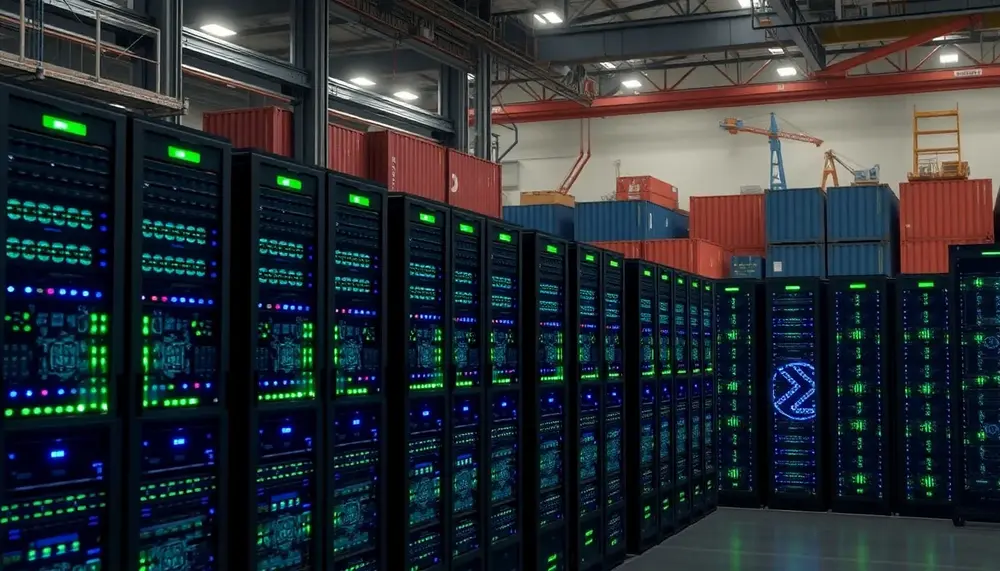Table of Contents:
Bitcoin Mining Faces Uncertainty Amid Tariff Challenges
The U.S. Bitcoin mining sector is bracing for significant challenges following the announcement of new tariffs by President Donald Trump. Effective April 5, these tariffs impose a minimum 10% duty on all imports, with additional increases for specific countries. Thailand and Malaysia, key players in the Bitcoin mining hardware supply chain, will face tariffs of 36% and 24%, respectively, starting April 9. This has raised concerns among mining companies heavily reliant on international supply chains.
Bitmain, a major hardware manufacturer headquartered in Beijing, operates production facilities in countries like Indonesia, Malaysia, and Thailand. In response to the tariff announcement, Luxor Technology, a U.S.-based Bitcoin mining software and services provider, expedited the shipment of 5,600 mining machines from Thailand to the U.S. within 48 hours to avoid increased costs. The sudden tariff changes have forced companies to reassess their operational strategies, potentially impacting the Bitcoin network's hash rate and the profitability of U.S.-based mining operations.
Get $500 free Bitcoin mining for a free testing phase:
- Real daily rewards
- 1 full month of testing
- No strings attached
If you choose to buy after testing, you can keep your mining rewards and receive up to 20% bonus on top.
“The long-term effects on Bitcoin mining infrastructure and supply chain security remain unpredictable, leaving companies on edge,” reported Cryptodnes.bg.
Key Takeaway: New tariffs could significantly disrupt the U.S. Bitcoin mining sector, increasing costs and forcing companies to adapt their strategies.
Cipher Mining Achieves Significant Growth in March
According to Investing.com Deutsch, Cipher Mining Inc. reported substantial progress in March 2025. The company mined approximately 1,210 Bitcoins and sold 206 BTC, ending the month with a treasury of 21,034 BTC. Operating 75,000 mining rigs with a hash rate of 13.5 EH/s, Cipher demonstrated operational efficiency with a fleet efficiency of 18.9 J/TH. Despite a 43% stock decline over six months, the company is advancing the construction of its Black Pearl data center ahead of schedule.
Analysts have highlighted Cipher's potential in the high-performance computing (HPC) market, with Clear Street and Rosenblatt issuing buy recommendations and setting price targets of $6 and $6.50, respectively. However, JPMorgan downgraded the stock to "Neutral," citing the need for additional capital to expand its hash rate. The company remains optimistic about securing lucrative HPC deals and expanding its market presence.
Key Takeaway: Cipher Mining's operational growth and strategic focus on HPC highlight its potential, despite market volatility and funding challenges.
American Bitcoin Initiative Aims for Mining Dominance
As reported by it-boltwise.de, the American Bitcoin Initiative, led by Hut 8 and supported by members of the Trump family, aims to establish the U.S. as a global leader in Bitcoin mining. The initiative plans to create one of the largest and most efficient mining platforms, leveraging cost-effective and renewable energy sources. This move comes as the U.S. considers establishing a strategic Bitcoin reserve, further emphasizing the project's significance.
Hut 8 currently holds over 10,000 BTC and aims to surpass this figure through the new initiative. The company also plans to list the venture on a U.S. stock exchange to secure additional funding. Despite criticism over energy consumption, the initiative emphasizes the use of renewable energy to address environmental concerns.
Key Takeaway: The American Bitcoin Initiative seeks to position the U.S. as a leader in Bitcoin mining, focusing on efficiency and renewable energy.
Trump's Tariffs Impact U.S. Bitcoin Mining
FinanceFeeds reports that President Trump's 34% tariff on Chinese imports could significantly affect the U.S. Bitcoin mining sector. With over 90% of mining equipment sourced from Chinese manufacturers like Bitmain and MicroBT, the tariffs are expected to increase operational costs by $2-3 million for mid-sized mining companies. Additionally, enhanced inspections by U.S. Customs have caused delays and compliance challenges for imported mining equipment.
In response, some companies are exploring domestic production and diversifying supply chains to mitigate the impact. However, these strategies come with their own set of logistical and compliance complexities. The tariffs could hinder the U.S.'s goal of dominating the cryptocurrency sector, but they also present opportunities for innovation and adaptation within the industry.
Key Takeaway: The 34% tariff on Chinese imports poses significant challenges for U.S. Bitcoin mining but also encourages diversification and domestic production.
MARA Reports 17% Increase in Bitcoin Mining
Investing.com Deutsch highlights MARA Holdings' 17% increase in Bitcoin mining production in March 2025, achieving a total of 242 blocks. The company, with a market capitalization of $4.3 billion, reported a 69% revenue growth over the past year. MARA's Bitcoin reserves reached 47,531 BTC, including lent and collateralized assets. The company also announced the near completion of a 40 MW data center in Ohio, aligning with its strategic expansion goals.
CEO Fred Thiel emphasized the benefits of MARAPool, the company's proprietary mining pool, which has outperformed the network average by over 10%. Analysts have set price targets between $14 and $30, reflecting confidence in MARA's market position and growth potential.
Key Takeaway: MARA's production growth and strategic investments underscore its leadership in the Bitcoin mining sector.
Sources:
- Bitcoin-Mining steht vor Unsicherheit, da Zölle die Lieferketten bedrohen
- Cipher Mining steigert Bitcoin-Produktion im März
- Amerikanische Bitcoin-Initiative strebt Vorherrschaft im Mining an
- Trumps Zollpläne könnten Auswirkungen auf den US-Bitcoin-Mining haben
- MARA meldet 17% Steigerung beim Bitcoin-Mining im März
- Hut 8 plant mit American Bitcoin die Dominanz im Mining
















